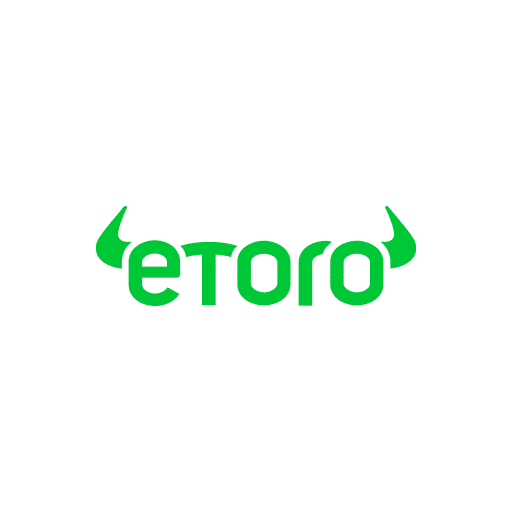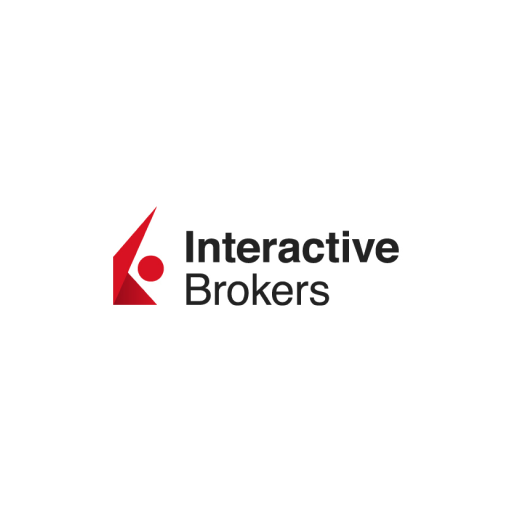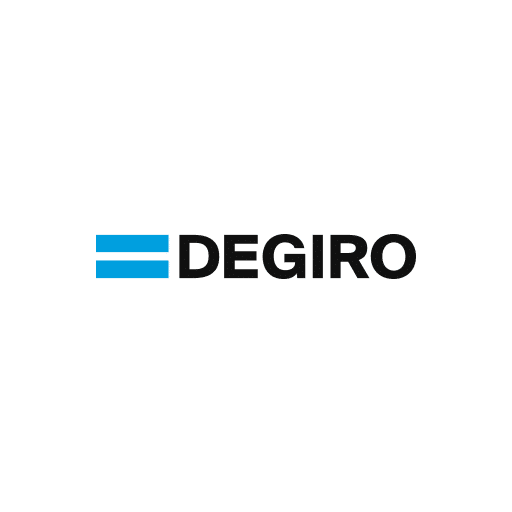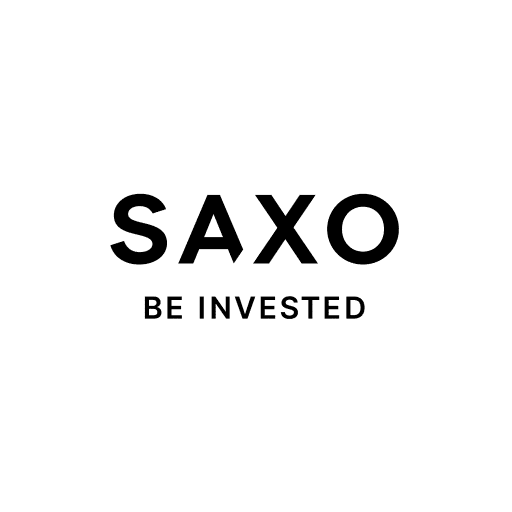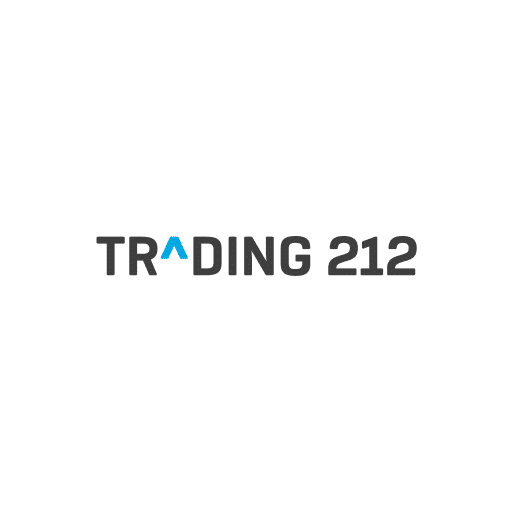Thinking about investing in stocks in Ireland? Well, you’ll need a good stockbroker.
In this article, we’ll guide you through the top contenders in the field, offering insights into the “Best Stock Brokers in Ireland.” From fees and investment variety to user-friendly platforms, discover the brokers that stand out in the Irish market, assisting you in making informed investment decisions.
Let’s explore the landscape of online brokers tailored to meet the unique needs of Irish investors.
Best Irish Stock Brokers
Don’t want to read the whole article? Here are our suggestions for the best Irish stock brokers:
- eToro: Best broker in Ireland for beginners and social trading
- Interactive Brokers: Best Irish broker for lowest FX fees
- Plus500: Ideal broker for demo accounts
- DEGIRO: Best broker in Ireland for long-term investors
- Saxo Markets: Best for experienced investors
- Trading 212: Best Irish broker for commission-free ETFs
- Lightyear: Best emerging low-cost broker in Europe
✔️ All of them are authorized to operate in Ireland by the Central Bank of Ireland.
76% of retail CFD accounts lose money.
82% of retail CFD accounts lose money.
Investing involves risk of loss.
62% of retail CFD accounts lose money.
Investing involves risk of loss.
Terms apply, seek guidance if necessary. When you invest, your capital is at risk.
Comparison Table of Best Irish Stock Brokers in 2024
| Online Broker | Minimum deposit | Fees on US stocks | Regulators |
| eToro | $50 | $0 | FCA, CySEC, and ASIC |
| Interactive Brokers | €0 | Between $0.0005 and $0.0035 per US share (min. $0.35) | FINRA, SIPC, SEC, CFTC, IIROC, FCA, CBI, AFSL, SFC, SEBI, MAS, MNB |
| Plus500 | €100 | $0.006 per share | FCA, CySEC, FSCA, FMA and ASIC |
| DEGIRO | €0 | €1 Commision + €1 Handling | AFM, DNB, BaFin |
| Saxo Markets | €0 | Up to 0.08% (min. $1) | ASIC, FSA, FCA, SFC, MAS, FINMA, DFSA |
| Trading 212 | €10 | €0 | FCA, CySEC, and FSC |
| Lightyear | €1 | 0.1%, up to $1 max (min $0.10 per order) | EFSA and FCA (As an AR) |
#1 eToro: Best broker in Ireland for beginners and social trading
eToro at a glance
One of the top trading platforms in Ireland is eToro, an international online broker with over 30 million users who trade stocks, forex, commodities, cryptocurrencies, CFDs, and ETFs. It is known for its social trading feature where you can copy the trades of other experienced traders. There are thousands of verified traders on eToro, and you can pick the best trader based on past Return on Investment (ROI), risk profile, or other factors.
The eToro platform gives users access to over 3,000 different financial instruments, including stocks and ETFs. Additionally, users can invest in ready-made investment portfolios (Smart Portfolios), a group of several assets or traders combined together based on a theme or strategy.
Plus, eToro offers commission-free stock and ETF trading in Ireland (other fees apply).
Opening an account and depositing is easy, and you can even try it out with virtual money (a demo account). On the downside, spreads can be high for some products. The only currency accepted (base currency) is the USD, which means that you’ll be charged currency conversion fees upon deposit and withdrawal if you deposit in another currency.
eToro is fully regulated and supervised by top-tier regulators such as the UK’s Financial Conduct Authority (FCA) and the Australian Securities and Investments Commission (ASIC) in Australia. The subsidiary in Europe, formerly known as “eToro (Europe) Ltd,” is authorised and regulated by the Cyprus Securities Exchange Commission (CySEC).
If you want to learn more, check out our eToro Review.
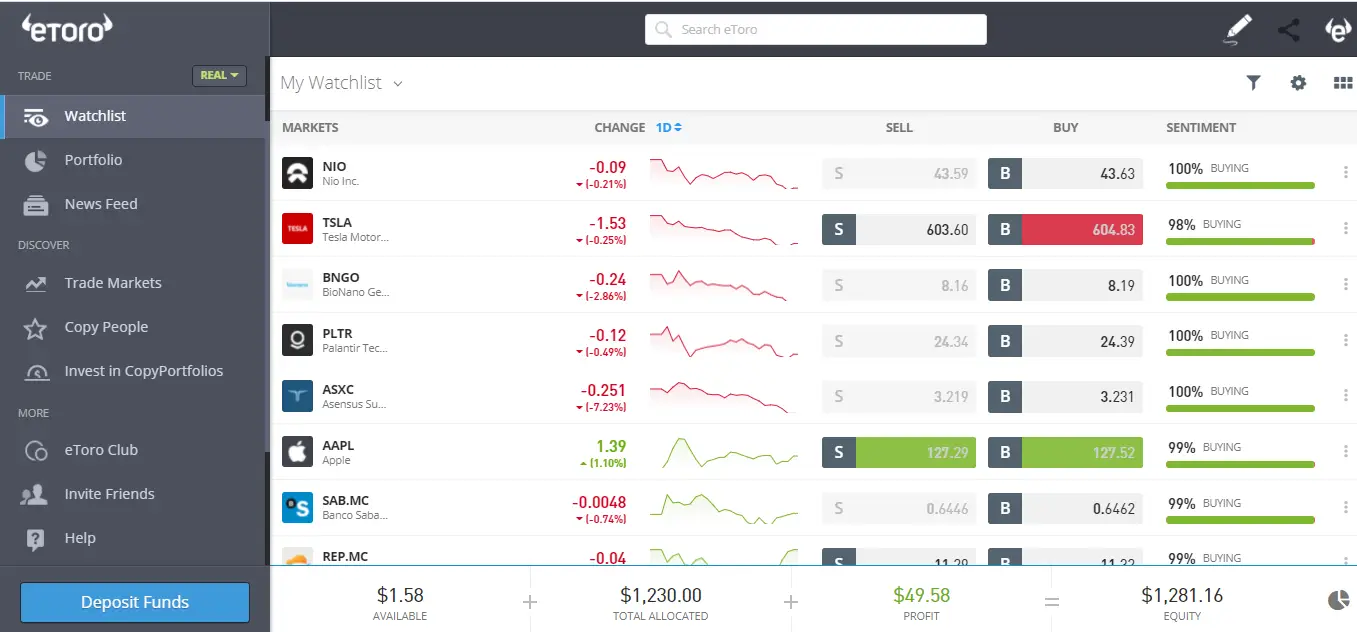
Pros
- Commission-free stock and ETF trading (other fees apply)
- Social Trading and other innovative products
- Wide variety of financial products
- Slick, modern, and easy for anyone to use
- Top tier regulators
Cons
- Limited disclosed financial information
- Withdraw and inactivity fees
- Spread, overnight, inactivity, and currency conversion fees higher than average
- Only one currency account (USD) - a currency conversion fee is applied if you deposit in a different currency
- Doesn’t offer bonds, futures, or options
#2 Interactive Brokers: Best Irish broker for lowest FX fees
Interactive Brokers at a glance
Another exceptional trading platform in Ireland is Interactive Brokers. Founded in 1978 and publicly listed in NASDAQ (ticker: IBKR), Interactive Brokers is a global online broker that surpassed major financial crises, showing resilience and a rigorous risk management process.
Interactive Brokers offers an advanced investment platform that includes a wide range of products (stocks, options, mutual funds, ETFs, futures, bonds, and currencies) from +135 markets, solid trade execution (IB SmartRouting), and a set of technical and fundamental tools to help you in your investment decisions.
Beginners and intermediate investors have educational tools to explore, but the learning curve will be steep. Besides, customer service gives crystal clear answers to your doubts, so there is no need to go back and forth.
On the downside, Interactive Brokers’ fee structure is quite complex, the registration process is lengthy (but fully online), and the broker doesn’t offer commission-free trading. However, when considering FX fees, narrower spreads, and the stock loan program, Interactive Brokers’ clients still get significant savings compared to most brokers.
Interactive Brokers also launched IBKR GlobalTrader, a modern mobile trading app to trade stocks, ETFs, and options, ideal for beginner investors. Some of the features of IBKR GlobalTrader include automatic currency conversions, fractional shares, and a demo account.
Want to know more about Interactive Brokers? Check our Interactive Brokers Review.
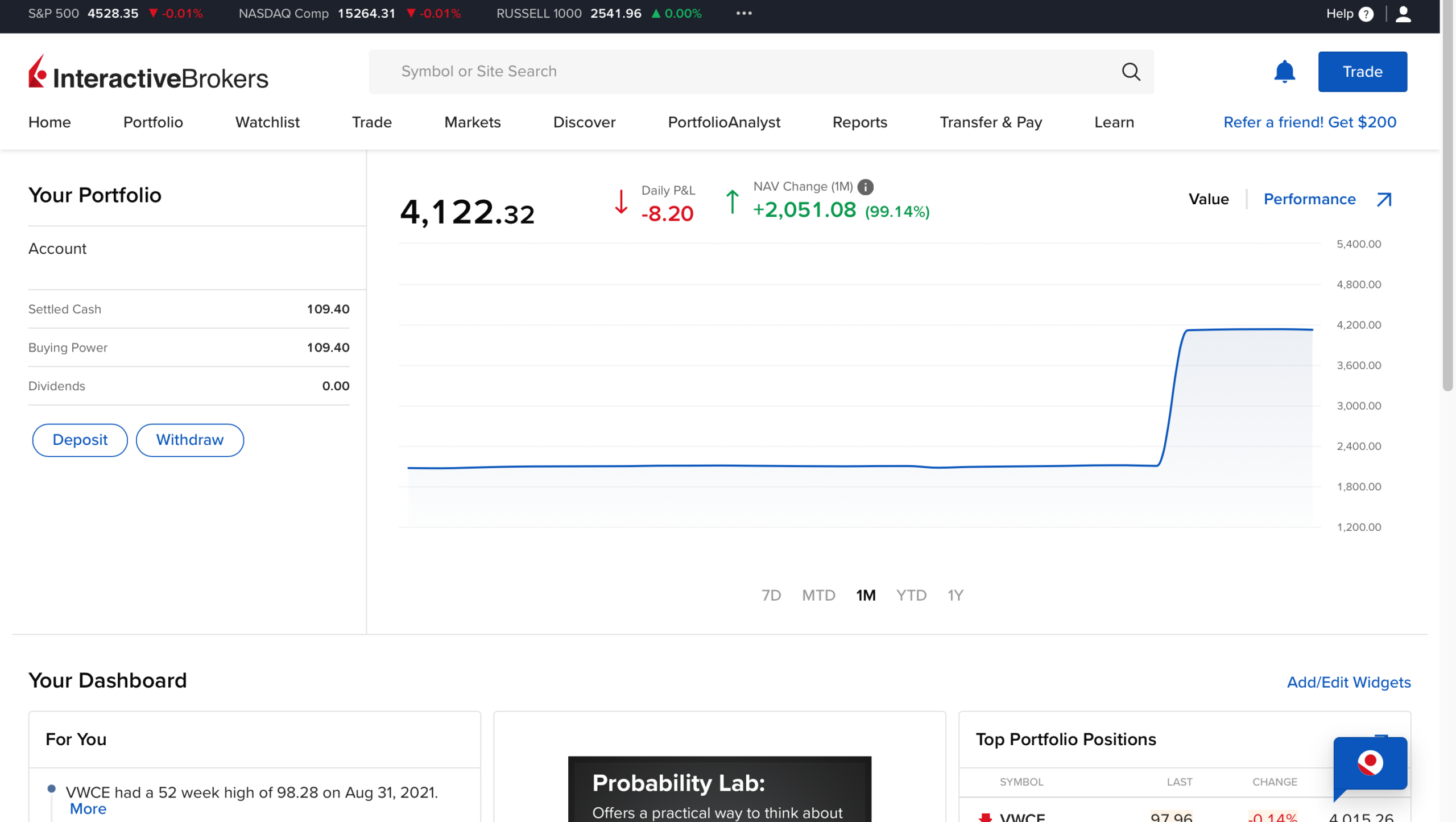
Pros
- Low commissions on US stock trading
- No monthly inactivity fee
- The broadest product and markets range in the brokerage industry
- Demo account
- Excellent reputation (founded in 1978)
- Extensive research and Education tools
- Has a modern mobile trading app to trade Stocks, Options and ETFs, ideal for novice investors, IBKR GlobalTrader.
- Offers interest on uninvested cash balances
Cons
- Complicated and lengthy account opening process (but fully online)
- Steeper learning curve for beginners
- Website is difficult to navigate
- Interactive Advisors (Robo-advisor feature) is only available for US customers
#3 Plus500: Ideal broker for demo accounts
Plus500 at a glance
Founded in 2008, Plus500 is an online broker offering a wide range of financial products, including real shares and CFDs on forex, indices, shares, commodities, options, ETFs, and cryptocurrencies. It is available in over 50 countries and is listed on the London Stock Exchange.
There are two distinct account types:
- Plus500 CFD: It only focuses on CFD products;
- Plus500 Invest: Where you can trade stocks (real shares);
The web platform you will use is the WebTrader, Plus500’s proprietary platform, offering a stable trading experience and reliable access from multiple devices, including a mobile app. All platforms are accessible and responsive, and you can start testing the features by opening a demo account.
Their customer support is helpful and readily assesses through a chat that is always shown on the trading platform. Their spreads are low, offering accounts in sixteen currencies, including USD, EUR, and GBP. Still, they charge a 0.70% currency conversion fee and a $10 monthly fee following three months with no activity. On Plus500 Invest, they only charge a small commission per trade (US market: $0.006/share).
Finally, it is regulated by financial regulators like the FCA and CySEC, meaning that Plus500 is appropriately supervised and that there is an investor protection scheme under the entity in which you open an account. For instance, If you open an account as a European investor through Plus500CY Ltd, you are protected up to €20,000. Additionally, Plus500 provides negative balance protection for CFD trading on a per-account basis – only to retail clients from the European Union.
Want to know more about Plus500? Check our Plus500 Review.

Pros
- Acessible and responsive platform
- Low spreads
- No dealing commissions
- Demo Account
- Top-tier regulators
Cons
- No ETF offering
- Inactivity fee ($10 per month after no login activity in 3 months)
- High overnight funding fees
- Very little research and education provided
#4 DEGIRO: Best broker in Ireland for long-term investors
DEGIRO at a glance
Founded in 2013, DEGIRO is a low-cost brokerage firm that has become very popular due to its low rates! With over 2.5 million users, the innovative platform has become widely known for its “do-it-yourself” philosophy in the sense that you have everything at your disposal to start investing on your own. It offers a wide range of financial assets to trade, including stocks, ETFs, bonds, options, futures contracts, warrants, investment funds, and some leveraged products (not quite the same as CFDs. More info here).
For instance, you can trade some ETFs for free (a €1.00 flat handling fee – external costs – still apply) with no minimum amount required. The web trading platform is basic, but it is efficient and straightforward to use. In a matter of minutes, you get used to it. The same applies to its mobile app. On the downside, there is an absence of significant fundamental research, a €1.00 commission for US stocks, a €2.50 connectivity fee applies, and pricing alerts are missing.

Regarding security, DEGIRO is the Dutch branch of flatexDEGIRO Bank AG (a German-regulated bank). In the unlikely event that the segregated assets cannot be returned to clients, DEGIRO falls under the German Investor Compensation Scheme, which compensates any losses from non-returned assets up to 90% (with a maximum of €20,000), so do bear this in mind if you are planning to invest much larger volumes. Furthermore, any money deposited on a DEGIRO Cash Account with flatexDEGIRO Bank AG will be guaranteed up to €100,000 under the German Deposit Guarantee Scheme.
Still any doubts? Go through our DEGIRO Review!
Pros
- List of commission-free ETFs available
- User-friendly web and mobile app
- Wide range of investment options
- Education material: Investor’s Academy and Investing with DEGIRO
- Low overall commission structure
- No account opening, inactivity, or withdrawal fee
Cons
- 0.25% currency conversion fee (charged if you deposit or invest in a different currency than your base currency)
- €/£1 flat handling fee (charged in most transactions)
- €/£2.50 of connectivity fee (paid annually), per exchange where you’re invested
- Does not offer Forex, CFDs, and Cryptos
- No demo account
- Little research
- Low-quality customer support
#5 Saxo Markets: Best for experienced investors
Saxo at a glance
Launched in 1992, Saxo Bank is one of the most solid financial entities in the brokerage industry, with a proven track record of success. It lets you trade over 70,000 financial instruments through their trading platforms: SaxoTraderPRO (for PC) and SaxoTraderGO (on mobile).
The wide range of cash and margin trading products across global markets includes stocks, ETFs, bonds, mutual funds, cryptos, options, futures, CFDs, forex, and more! Saxo Bank presents its advanced research tools for “Buy and hold or trade on leverage”.
The Saxo Bank account tiers are the following:
- Classic: A minimum €2,000 deposit is required (depending on the country of residency), giving you access to tight spreads and customer and technical support 24/5.
- Platinum: A minimum €200,000 deposit is required. In addition to Classic features, it also lowers trading prices by up to 30% and prioritizes local-language customer support.
- VIP: A minimum €1,000,000 deposit is required. Here, you will find the best prices, access to trading experts, and exclusive event invitations.

The pricing structure will vary according to your account tier. For instance, a US stock order will be 0.08% of the trade value, with a minimum of $1 in Classic. However, within the VIP tier, the same trade would be 0.03% of the trade value with the same minimum of $1. Plus, for accounts with stocks, ETFs/ETCs, or bond positions, a custody fee of up to 0.15% p.a. will apply.
The listed prices are approximate and will differ based on the resident country. For precise pricing details, refer to the platform’s trade tickets for a comprehensive overview.
Saxo Bank A/S is a fully licensed European bank under the supervision of the Danish Financial Supervisory Authority (FSA). Saxo Bank is a member of the Danish Guarantee Fund, which protects client cash deposits up to €100,000 and financial securities (stocks, ETFs,…) up to €20,000 per client.
Pros
- Excellent research materials
- Outstanding trading platforms (SaxoTraderPRO and SaxoTraderGO)
- Extensive range of investment products
- Long track record
- Supervised by worldwide top-tier regulators
Cons
- High minimum deposit (varies between countries)
- Fees higher than average
- Fee structure is complex
- Does not accept US residents
#6 Trading 212: Best Irish broker for commission-free ETFs
Trading 212 at a glance
Founded in 2006, Trading 212 is a fintech based in London that aims to democratize the entire investment process through a simple mobile application. The company aims to do this by allowing anyone to invest in over 10,000 stocks and ETFs, Forex, commodities, CFDs, and cryptocurrencies. Over 15 million people have already downloaded the app.
In Trading 212, you will find commission-free stocks and ETFs trading, fractional shares, and even an automatic investment system (Robo-advisor). Opening an account is extremely quick and easy. On the downside, it shows limitations regarding available products, such as the lack of bonds and options. It charges a 0.15% currency conversion fee when buying assets in a currency different from your base account.

Within the app, you will notice two distinct sub-platforms: Trading 212 Invest, where you can trade a range of assets free of charge, and Trading 212 CFD, where you may trade leveraged financial products (CFDs).
On Trading 212 CFD, the currency conversion fee (FX fee) is higher (0.50%) than on Trading 212 Invest (0.15%).
The minimum deposit and withdrawal amounts are both €10. There are no deposit fees if you use bank transfer (other options include cards and Google/Apple Pay). For withdrawals, there is no fee, regardless of the method used.
In terms of safety, every Trading 212 is regulated by the following regulators: the Financial Conduct Authority (FCA), the Cyprus Securities and Exchange Commission (CySEC), and the Financial Supervision Commission (FSC).
If you want to learn more, check our Trading 212 Review.
Pros
- Commission-free Real Stocks and ETFs trading
- AutoInvest & Pies feature
- Fast and easy account opening process
- Demo account
- Top Tier Regulators
- One free share worth up to €100 using the promo code "IITW"
Cons
- Limited product portfolio (no Options, Bonds, Mutual Funds or Futures)
- No relevant Fundamental tools
- Spreads on Forex CFDs may be high in certain trading hours
- Foreign exchange fees (0.15% and 0.50% in “Invest” and “CFDs” accounts, respectively)
#7 Lightyear: Best emerging low-cost broker in Europe
Lightyear at a glance
Lightyear is a European investment app that operates via the entity Lightyear Europe AS, authorized and regulated by the Estonian Financial Supervision Authority (EFSA – license number 4.1-1/31), with clients’ assets covered up to €20,000.
There are no Lightyear execution fees to trade ETFs. For stocks, commissions do not go over €/$/£1 per order, and there is a flat 0.35% fee for currency conversion (this fee can be minimized by their multi-currency account in EUR, GBP & USD). Lightyear offers one of the highest interest in uninvested cash: 4.50% in USD, 3.25% in EUR, and 4.50% in GBP (As of April 2024).
The investment platform is suitable for beginners and intermediate investors who can safely invest in fractional shares. With an easy-to-use app and more than 3,500 stocks available from the US, UK, European, and Asian markets, Lightyear is an excellent way to get exposure to the stock market.
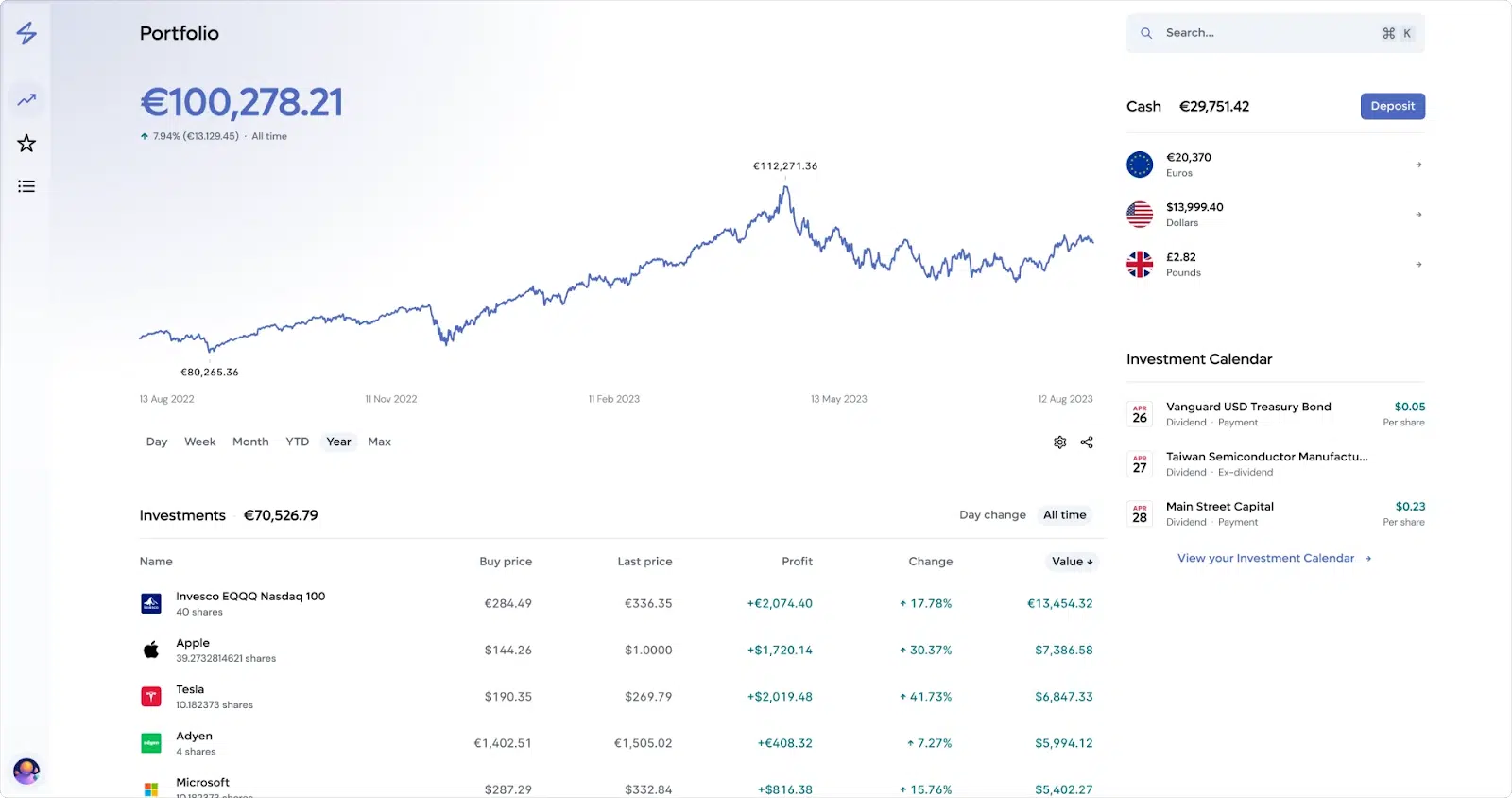
There are, however, some downsides to Lightyear’s investing app: the product offering is limited (there are no options, commodities, or Forex), and there is no demo account.
Disclaimer: Capital at risk. The provider of investment services is Lightyear Financial Ltd for the UK and Lightyear Europe AS for the EU. Terms apply: lightyear.com/terms. Seek qualified advice if necessary.
Pros
- Minimum deposit of €/£/$1
- No Lightyear execution fees for ETFs (other fees may apply)
- Interest on EUR, USD and GBP cash
- Access to fractional shares and money market funds
Cons
- Limited product offering
- No demo account
How to buy shares in Ireland
Buying shares (or stocks) in Ireland using an online broker includes several steps. Keep in mind that specific steps may vary depending on the broker you choose. Always refer to the broker’s platform and customer support for the most accurate and up-to-date information.
- Research and Choose an Irish Stock Broker – Look for online brokers that operate in Ireland and provide services for buying and selling shares. Some popular options include DEGIRO, eToro, and Interactive Brokers.
- Open an Account – Visit the website of your chosen broker and open an account. You’ll typically need to provide personal information, proof of identity, and financial details. This process may involve submitting documents online.
- Deposit Funds – Once your account is set up, deposit funds into your brokerage account. This is the money you’ll use to buy shares. Most brokers accept bank transfers and sometimes other payment methods.
- Research Stocks – Before buying shares, research the stocks you’re interested in. Understand the company’s performance, financials, and any other relevant information. Most brokers provide research tools and information on the stocks they offer.
- Place an Order – Log in to your brokerage account and navigate to the trading platform. There, you can place an order to buy shares. You’ll need to specify the number of shares you want to purchase and the type of order (market order, limit order, etc.).
- Review and Confirm – Before finalizing the order, review the details to ensure everything is accurate. Confirm the order, and it will be processed by the broker.
- Monitor Your Investments – Keep an eye on your portfolio and monitor the performance of your investments. Most online brokers provide tools and resources for tracking your holdings.
- Tax Considerations – Be aware of the tax implications of buying and selling shares in Ireland. Consult with a tax advisor to ensure you comply with local tax regulations.
Remember that investing in the stock market carries risks, and it’s important to make informed decisions. If you’re new to investing, consider seeking advice from financial professionals or doing thorough research before making any investment decisions.
Which platform should you choose?
Some factors you should know when choosing an online broker are the fees charged if it is regulated by top-tier institutions such as the FCA in the UK, the range of products it allows you to trade (not all platforms allow you to trade EU stocks), among others.
Our top pick include:
| #1 | eToroBest broker in Ireland for beginners and social trading. |
| #2 | Interactive BrokersBest Irish broker for lowest FX fees. |
| #3 | Plus500Ideal broker for demo accounts. |
| #4 | DEGIROBest broker in Ireland for long-term investors. |
| #5 | Saxo MarketsBest for experienced investors. |
| #6 | Trading 212Best Irish broker for commission-free ETFs. |
| #7 | LightyearBest emerging low-cost broker in Europe. |
The best online broker in your specific case will depend on your profile, preference, and objectives. Explore the websites above and decide for yourself!
A reminder that the above should not be seen as investment advice and should be considered information only. Investors should do their own research and diligence about the best-suited services and opportunities for their risk, returns, and impact strategy.
Final Thoughts
In conclusion, finding the best stockbroker in Ireland is like discovering the perfect companion for your investment journey. Each broker has its strengths, whether you’re a beginner looking for simplicity or an experienced investor seeking advanced features.
From eToro’s user-friendly approach to Interactive Brokers‘ low FX fees and DEGIRO’s appeal to long-term investors, there’s a fit for every investor. The key is understanding your preferences, considering factors like fees, and choosing a broker that aligns with your investment goals. With the right broker by your side, you’re well-equipped to navigate the Irish stock market and embark on a successful investment adventure.
Happy investing!
FAQs about Stock Brokers in Ireland
How to invest in stocks from Ireland?
You can use one of the online brokers shown above: eToro, Interactive Brokers, DEGIRO, Plus500, Saxo Markets, Trading 212, and Lightyear.
What is a brokerage company?
It is an entity designed to be the middleman between you and the people you are trying to buy or sell a stock, ETF, crypto,… you name it!
Which broker is best in Ireland?
There is no single answer. It depends on what you value most: fees, security, investment platform or any relevant feature.
What are the types of investments you can make with a brokerage account?
You can trade stocks, ETFs, Forex, Bonds, Futures and CFDs on stocks, ETFs, indices, cryptocurrencies, commodities.
How to avoid paying capital gains tax on shares in Ireland?
To potentially avoid capital gains tax on shares in Ireland, use tax-efficient accounts like a PRSA (Personal Retirement Savings Account) or consider tax-free allowances. Consult a tax advisor for personalized advice.
